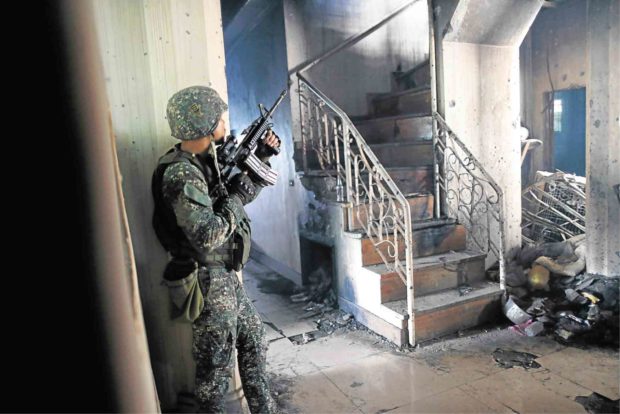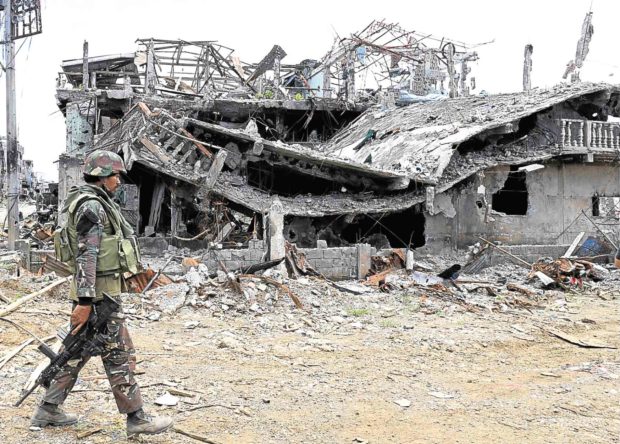Army judgement key to fate of martial law in Mindanao

A government soldier enters a house previously occupied by Islamic State (IS) followers in Marawi, where entire structures (top photo) had been flattened in the war to stop IS from setting up a province in the predominantly Muslim city. —PHOTOS BY JEOFFREY MAITEM
MARAWI CITY—The future of martial law in Mindanao could hinge on a military assessment of which areas would be removed from martial law coverage once the war on terror in this city was over, according to a high ranking military official.
Lt. Gen. Carlito Galvez Jr., commander of the Philippine Army’s Western Mindanao Command, said military officials involved in the fight here would make an assessment of which areas could be removed from martial law coverage after they were done with the campaign to flush out terrorists from this city.
Fighting escalated into full war on May 23 after members of homegrown crime groups Maute and Abu Sayyaf tried to set up an Islamic State (IS) province in this predominantly Muslim city.
“We would like to consult first our ground commanders,” Galvez said.
“After the Marawi siege, we will make a thorough assessment of what areas we can recommend to remain under martial law,” he added.
Article continues after this advertisementKeeping martial law
Article continues after this advertisementHe said, though, that “a lot of government officials” had expressed desire to keep martial law in place in this city and the entire province of Lanao del Sur, which geographically has jurisdiction over Marawi.
Congress had extended the effectivity of martial law in Mindanao, declared by President Duterte through Proclamation No. 216, until December because of the continuing war here.
But Jerome Succor Aba, chair of the group Suara Bangsamoro, said in a statement that the effects of martial law were not to bring peace or stability in Mindanao. Aba said the opposite happened—an unstable peace and order situation.
He said martial law simply justified the militarization of urban areas in Mindanao and heightened military operations in the region.
“We fear the effects of war on the civilian population,” Aba said.
He cited the case of the 2013 Zamboanga siege where displacement, death, hunger and poverty continued to hurt civilians a year after the conflict.
Zamboanga example
Followers of Moro leader Nur Misuari occupied Zamboanga City in a bid to declare an independent state, leading to a massive operation by the government to retake the city from Misuari’s men.
“Our utmost concern is the lives and livelihood of the civilians if the Duterte administration chooses to proceed with urban militarization and aerial bombings,” said Aba of the Suara Bangsamoro.
“War in this context is unnecessary and solves nothing,” Aba said.
Shortly after IS followers Maute and Abu Sayyaf established positions in Marawi, Mr. Duterte responded by declaring martial law in the entire Mindanao island.
The war that followed flattened the predominantly Muslim city once dotted by minarets and where Muslims and Christians coexisted peacefully.
The President had repeatedly made public his thoughts about extending martial law coverage nationwide, drawing criticisms from Church and civil society leaders.
Critics of Mr. Duterte vowed to fight a declaration of nationwide martial law and warned it would lead to massive protests. —JEOFFREY MAITEM
